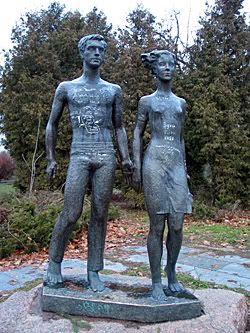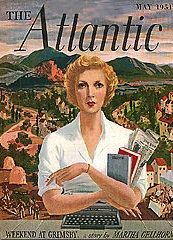It was roughly 18 hours before my c-section when we saw this sculpture of a young guy and a girl, sort of pretty, but looking overly enthusiastic in a very Soviet way:

All kinds of things were written all over their darkened bronze bodies, and we decided to have a closer look. In addition to curses and other such stuff, both figures had names painted in white on their foreheads: the boy was Zhenia, and the girl - Marta!
I, of course, took it as a sign, a good one.
***
People keep asking why we chose to name our daughter Marta. My dear friend has told me today his mother asked him, too, and he replied that Veronica had seen this name written on the forehead of a park sculpture, that's why.
It's not, of course. Nor is it because I got pregnant in March (mart in Russian), as someone else concluded.
A shortcut explanation for the name choice is this: 'Marta' sounds beautifully on its own as well as with Mishah's last name, Smetana (translated as 'sour cream').
The real reason, though, is Martha Gellhorn, an incredible war correspondent, an incredible woman, whose work I was reading in St. Pete in spring 2004: I remember very well how I walked to the other room at some point and asked Mishah if he liked the name Marta. He said he did.

The problem is very few people know anything about Martha Gellhorn, and it usually takes awfully long to explain why she's so cool I've decided to name my daughter after her: how she started her career in 1937, covering the Spanish Civil War, and finished it in Panama at the age of 81, in 1990, covering the U.S. invasion; how a few years later she admitted she was too old to go to Bosnia; how she was Ernest Hemingway's third wife and he was her second husband, and how she was his only wife to dump him before he did (the nurses back at the hospital used to roll their eyes a little at this point)...

Hmm. Drawing on my expertise in buying useless dictionaries, I can say that smetana and cognate words mean cream in Belorussian, Polish and Czech. Sour cream is referred to by the same word in Polish. Not sure about the others.
ReplyDeleteIf we put some faith in folk etymology, Russians would appear to have made cream, slivki, by decanting it(slivat') and sour cream by wiping it off (smetat').
But thanks to V. Dal' we know that in Kaluga dialect, at least, cream was once called sladkaja smetana, or sweet sour cream. My limited expertise in shopping for dairy products falls short on this one, as I've been clearly going for the wrong stuff.
Another Misha With a Boring Last Name